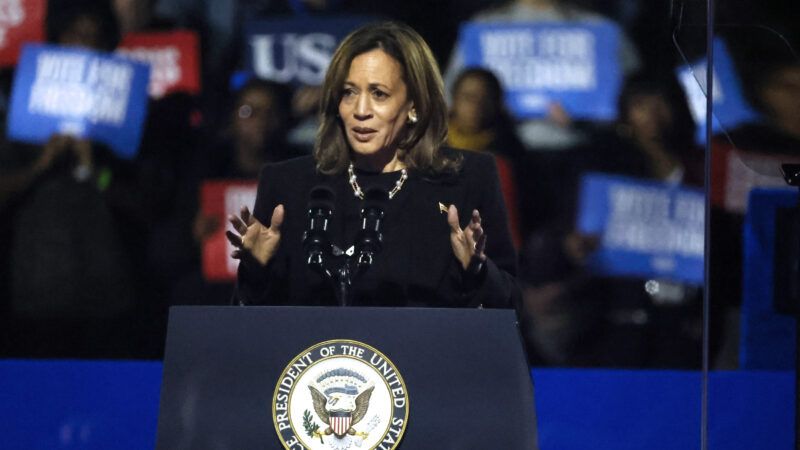Donald Trump Won Because Kamala Harris Is Joe Biden but Worse
It's no mystery: Harris declined to run away from Biden's disastrous and unpopular policies.

Donald Trump has once again won the presidency—and has done so convincingly.
In the coming days and weeks, commentators will spill considerable ink trying to make sense of this result. Mainstream media figures must grapple with the fact that a seemingly disgraced, twice-impeached, convicted felon—one frequently derided as a fascist and a racist—was reelected president. Moreover, he made major inroads with minority communities, vastly improved his totals in various states, and is currently projected to win the popular vote. Make no mistake: This is a significant win for someone deemed not merely unelectable but wholly evil by every elite media institution in existence.
Pundits trying to understand how Trump could have possibly achieved this unthinkable comeback will focus on his message, his issues, and his campaign strategies. They will investigate the aspects of Trump that make him so appealing to throngs of Americans. But they might overlook the single most important contributing factor in Trump's victory: not an affirmative vote for the candidate, but rather a negative endorsement of his opponent, Vice President Kamala Harris.
Simply put, Harris was a disastrous candidate. Admittedly, she had a tough job, given that she replaced the presumptive Democratic presidential nominee—President Joe Biden—in the eleventh hour. But keep in mind that Biden was historically unpopular. He bottomed out at a 38 percent approval rating, which made him the least popular president in 70 years. Some of that disapproval was due to his advanced age and obvious cognitive decline, and in that respect, Harris was an automatic improvement.
But the fundamental mistake of the Harris campaign—the one that assured Trump's reelection no matter how improbable it seemed to elite tastemakers—was assuming that a simple candidate swap would be sufficient. This was egregiously wrong. Biden was not merely unpopular because he was too old to serve as president. He was unpopular because the American voters dislike his policies. On the issues that mattered most to voters—the economy, inflation, and immigration—majorities of voters solidly preferred Trump over Biden, well before the June debate performance that doomed the incumbent president's candidacy. Voters remembered the Trump economy fondly and blamed Biden's policies for ever-worsening inflation.
Once Harris was installed as the candidate, she had the opportunity to engage in a reset. While she always faced the inherent difficulty of distancing herself from an administration in which she served, she had every opportunity to throw Biden under the bus and part ways with his policies. She could have criticized his economic setbacks, his foreign policy—which was especially unpopular in the must-win state of Michigan—and his border program.
Yet one month ago, when she appeared on The View, the hosts asked Harris if there was anything she would have done differently from Biden. Her answer? "There's not a thing that comes to mind."
That was an incredible mistake. The American people could not possibly have signaled any more strongly that they wanted a change—a fundamental break—with the inflationary policies of the Biden administration. Harris did not run from these policies: She cosigned them.
Indeed, there are several ways in which Harris may have been a worse candidate overall than Biden. It's true that Biden's rapidly declining mental state made him a likely loser in the 2024 election. But Biden, at least, had a track record of winning previous elections. Harris' only foray into national presidential campaigns ended disastrously, with her early exit from the 2019–2020 race. That was after she adopted a number of toxically unpopular progressive stances, many of which she was forced to shed over the course of the last four months. This rendered her a decidedly weak candidate; say what you will about Biden, but he had the good sense not to alienate Pennsylvania voters by endorsing a fracking ban.
Harris never ran from Biden's record or pretended that she represented some actual sea change in policy. Her pitch was: Biden's second term, overseen by a younger and more capable person.
This pitch did not merely come up short—it vastly underperformed expectations. That's because voters wanted to part ways with both Biden and his inflationary policies.
Whether Trump can deliver on his promises and restore the country's future remains to be seen. But one thing is for certain: The decision to suddenly and dramatically install Harris as the Democratic nominee—without any change whatsoever to the Democratic Party's underlying policy agenda—will be seen as a foolish mistake. Americans don't want Biden, but they don't want Bidenism either. Harris was more of the exact same.


Show Comments (159)